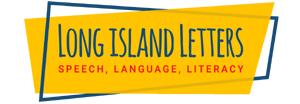LONG ISLAND WRITING SPEAKING THERAPY TUTORING

LONG ISLAND WRITING SPEAKING THERAPY TUTORING

Our Speech Therapist Come to Your Long Island Home! | Top In-Person & Remote Private Pay Writing Speaking Therapy Tutoring | Free Consultation and Meet & Greets With Our Staff
Our Speech Therapist Come to Your Long Island Home! | Top In-Person & Remote Private Pay Writing Speaking Therapy Tutoring | Free Consultation and Meet & Greets With Our Staff
LONG ISLAND (NASSAU AND SUFFOLK COUNTIES) NEIGHBORHOODS
We also travel to Hamptons (summer speech language therapy)
Our Speech-Language Pathologists and Therapists
We travel to you and we also offer remote services. Some of our speech-language pathologists are trained in the Orton Gillingham approach. Many of our speech-language pathologists are trained in literacy and offer support with decoding,
spelling and reading fluency services. Our speech-language pathologists and therapists work with babies, toddlers, school-age students, and adults with expertise in:
- Pronunciation/Enunciation
- Articulation
- Expressive Language Disorder
- Writing & Speaking Therapy
- Comprehension- Listening & Reading
- Listening Comprehension
- Auditory Processing
- Vocabulary
- Teens – Language Therapy
- Stuttering
- Feeding
- Oral Motor
- Voice
- AAC
- Adult Speech Therapy
- Public Speaking
- Accent Reduction Modification Speech Therapy
Our Speech-Language Pathologists and Therapists
We travel to you and we also offer remote services. Some of our speech-language pathologists are trained in the Orton Gillingham approach. Many of our speech-language pathologists are trained in literacy and offer support with decoding, spelling and reading fluency services. Our speech-language pathologists and therapists work with babies, toddlers, school-age students, and adults with expertise in:
A house without a foundation is like the movie The Money Pit . It is bound to crumble down. Likewise, verbal language is the basis for written and social language. Poor verbal skills result in difficulties in expressive writing, academics, and social skills.
Let us quickly introduce three types of verbal language (narrative, expository, conversational); two of them play integral parts for developing appropriate expressive writing skills. Narrative language (emerges in preschoolers) includes the ability to share experiences, describe ongoing activities, and/or plan/predict future activities, explain and tell stories.
Narrative language is different than conversational speech because the former is typically told by one speaker, while others listen. The last type of verbal language to develop is called expository language. Its main purpose is to instruct. From third grade on, students are expected to describe, define, and explain information, e.g. oral and written reports for history or science etc., in a coherent manner. As academic demands increase over the school years, there is a larger emphasis on expository verbal language and expository literacy. Learn what is the link between executive functioning and language. Download our What is Executive Functioning Pamphlet!
Narrative and expository language are the bridge between oral and written language development. Kind of like how the Verrazano connects Staten Island to Brooklyn. However, some children will require a little assistance in the form of writing and speaking tutoring to develop their narrative language skills. And that’s where we come in.
Our language experts are like the Olympic coaches of speech. When we are working with students, we specialize in both written and verbal skills. After all, you can’t have one without the other. That would be like peanut butter minus jelly.
Writing Intervention
- Analyzing complex sentences – Students flush out the meaning of the complex language and vice versa: students combine simple sentences into complex sentences.
- Creating complex sentences – Teaching connecting words, such as temporal words, e.g. then, before, after, etc., causal relations, e.g. because, so, etc., conditional relations, e.g. if-then, etc.
- Elaborating noun phrases, e.g. adding the clause “who study dinosaurs” to the word “paleontologists”, e.g. “Paleontologist, who study dinosaurs,” etc.
- Elaborating verb phrases, e.g. teaching adverbs, e.g. extremely, sadly, quite, etc.
- Teaching vocabulary (nouns, action words, descriptors)
- Grammar (sentence construction, verb tense, etc.)
- Improving organization/cohesion of ideas (map out setting, identifying problems, goals, and episodes, connecting ideas, visual and verbal organizers, etc.)
- Facilitating social skills.
Click the link to find out more about Long Island Letters’ writing intervention program.


Speaking Therapy
Sharing is caring. We let the students know what we are doing, so they can be part of the process. We also take their interests, strengths, and learning style into account, maximizing effectiveness and ensuring the students don’t get frustrated. After all we are not trying to fit a square peg into a round hole. If your child likes music and flying saucers, let’s incorporate it! Drawing and imaginary animals? For sure! These skills are targeted during fun activities for remediation, and they are also implemented in the student’s curriculum.
When developing activities to enhance oral and written language skills, we include activities such as pictures (including drawing), books (including wordless picture books), imagination games, personal experiences, art activities, dramatic play, journals, book reports, music, editing (including correcting the tutor’s mistakes), and several other fun and effective exercises.
Find out more about our literacy tutoring services and get to know our literacy specialists here! We also provide spelling intervention and vocabulary tutoring to further enrich your child’s language skills.
MEET OUR LONG ISLAND SPEECH LANGUAGE THERAPISTS AND PATHOLOGISTS WHO TRAVEL TO YOUR HOME

Allison W.
Master’s in Language Pathology

Jenny W.
M.S., CCC-SLP, Speech Language Therapist, TSSLD

Annie Rose
M.S., CCC-SLP, Speech Language Therapist, TSSLD

Nicole S.
M.S., CCC-SLP, TSSLD, Speech Language Therapist

Alexandra O.
M.A., CCC-SLP, TSSLD

Nicholas
M.S., CCC-SLP, Speech Language Therapist, TSSLD

Jessica
Master of Science Degree in Communication Sciences & Disorders, Certified Teacher of the Speech and Hearing Handicapped (TSHH)
FREE CONSULTATION!!!
Call: (347) 394-3485,
Text: (917) 426-8880
Email: [email protected]
(we respond to email right away!)



















